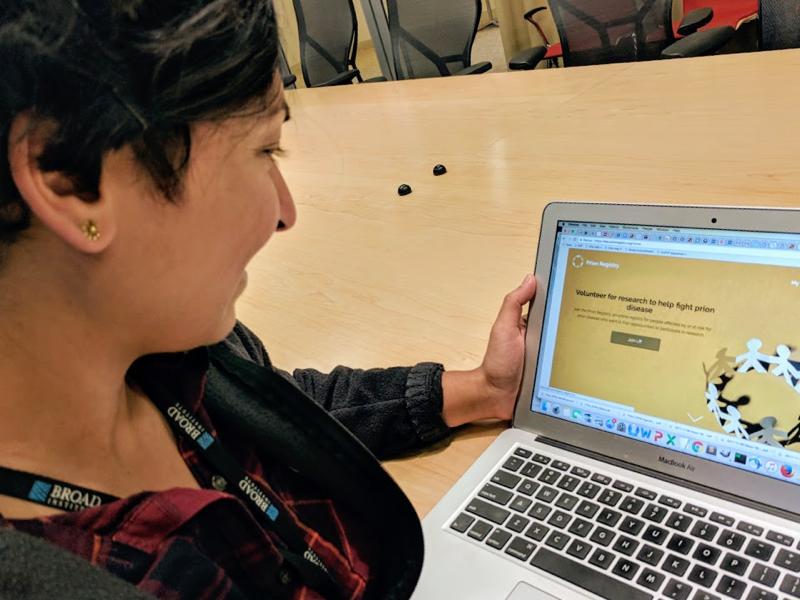Prion Registry: an online tool to connect patients, families, and researchers

It takes a village to develop a drug — especially the very first treatment for a rare disease.
Right now, we don’t have an effective treatment for prion disease. This will change – and we are optimists that this change could happen in our lifetime. But to most effectively race towards tomorrow’s treatments, there are pieces we have to put in place today.
One of those pieces, we have come to believe, is a registry – a simple, secure, online portal to help connect patients and individuals at risk to research and eventually, to trials.
Rare diseases face special challenges in drug development – both financial and logistical. Encouragingly, every year we are seeing new examples of rare disease research communities that surmount these challenges and bring a first effective treatment to patients. What can we learn from these success stories? One trend we see very consistently is that those disease communities organized themselves ahead of time. Patients and people at risk made themselves easy to count and to keep in the loop, and this proved to be a critical piece of the drug development puzzle.
In prion disease, there are many different groups that interact with patients and families – we at Prion Alliance, the CJD Foundation, the CJD International Support Alliance, the national surveillance center, various clinics around the country and the world. Everyone has a different set of patients and families they’ve been in touch with. This information exists in many separate places, and no one has systematically asked people about whether they are interested in participating in research.
As we’ve come to appreciate the massive effort that goes into running a clinical trial, we’ve realized something scary: if someone launched a trial for an experimental prion disease drug today, there would be no simple way to find and contact all of the patients or people at risk who might be interested in signing up to take the drug. Even more concerning, this difficulty could have a chilling effect upstream, on the numerous collaborators and funders needed to even get to the point where we have a drug to test. Right now we would have a lot of trouble demonstrating to these sorts of partners that if we were to run a trial there would be enough people out there interested in enrolling. And this could scare people off from funding a study or developing a drug in the first place.
Seeing these gaps motivated us to band together with the other patient groups to design a simple, secure online tool to try to address them. We conceived of an online registry, open to anyone in the world. We settled on a patient-centric model, where patients or people at risk manage their own profile, and can view studies and choose to contact researchers if they are interested in joining. We designed a simple, 10-minute medical questionnaire making it easy for patients to sign up and provide basic information on themselves. And we decided to make this resource available to any researcher with appropriate ethical approval to do a study on human subjects. But importantly, participants’ names and contact information are not available through the registry. The choice to take the next step, and establish contact with a researcher or study coordinator, is always in your hands. As genetic prion disease family members ourselves, it was hugely important to us that this tool be built around patients’ and families’ privacy and their choice to opt in, or opt out at any time.
With the help of the Data Donation Portal software development team here at the Broad Institute that generously donated their time to this effort, we’re now pleased to launch a first version of this site! You can check it out at prionregistry.org.
Participating in research is a huge, huge piece of moving us towards an effective treatment for prion disease. We committed to this project because we believe in the power of bringing our community together to speed up progress towards a cure. If you do want to participate in research, you’ll be able to use the registry to view a list of some studies that are publicly recruiting.
Even if you aren’t sure if you ever want to participate in research, there is a lot of good that can come from signing up and simply answering the consent form and questionnaire. A big part of this is just standing up and being counted. If we’re ever going to get a drug for prion disease, there will have to be a clinical trial, and in order to do a clinical trial, we need to know how many people are out there.
Please note that the registry site is not, itself, a promise of direct benefit to any given individual. The registry is not offering any clinical treatment nor currently recruiting for clinical trials. Instead, right now it provides information on participating in research that will help advance the science of prion disease. And in the long run, it is a tool to help our community stay informed and move together in the right direction.
This site is a work in progress and we hope to roll out more functionality over time – but in the meantime we are thrilled that it is live, and look forward to partnering with you towards our common goal of a treatment or cure for prion disease!

